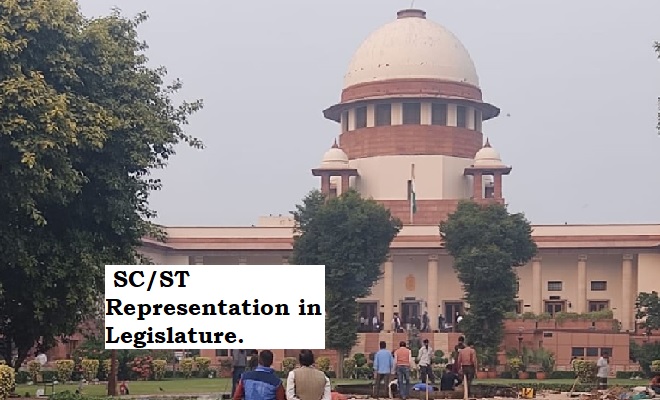


In a consequential judgment delivered in November, the Supreme Court confronted the issue of proportionate representation for Scheduled Tribes (STs) in the Lok Sabha and Legislative Assemblies of the states of West Bengal (WB) and Sikkim. The Court, however, refrained from issuing directives for such representation, citing the necessity for amendments to the Representation of Peoples Act. It deemed this matter as falling within the legislative domain, requiring parliamentary action rather than a judicial mandate.
The Court underscored that the existing reservation schedules in the Representation of Peoples Act were established based on the 2008 Delimitation Order. To rectify the lack of proportionate representation, the Court asserted that a legislative amendment was imperative. However, it asserted its incapacity to mandate such an amendment, emphasizing the separation between the legislative and judicial spheres. The Court expressed reluctance to overstep its bounds by prescribing a specific legislative approach for providing additional representation to communities within the Scheduled Tribes beyond what was outlined in Section 7(1A) of the Representation of Peoples Act 1950.
Simultaneously, the Court directed the Union Government to consider invoking the powers conferred by the Delimitation Act to ensure proportional representation for both Scheduled Castes and Scheduled Tribes. It mandated the government to make a decision promptly and in accordance with the law, emphasizing the need for expeditious action in implementing Articles 330 and 332.
The Court clarified that its judgment wouldn't interfere with the election schedule set by the Election Commission for parliamentary or state legislative assembly elections. This caveat aimed to ensure that the legal proceedings and directives did not disrupt the electoral process outlined by the Election Commission.
Delving into the factual background of the case, it revolved around the inclusion of the Limboo and Tamang communities in the Scheduled Tribes list for the states of West Bengal and Sikkim through the Scheduled Castes and STs Orders (Amendment) Act 2002. However, the Delimitation Notification of 2006, issued by the Delimitation Commission, failed to account for these communities designated as Scheduled Tribes under the 2002 amending Act.
The Election Commission presented a counterargument, contending that the reservation of seats necessitated amendments to the RP Act, exclusively within the purview of Parliament. Additionally, the readjustment of seats required a legal provision empowering the Commission to undertake changes in Delimitation Orders issued by the Delimitation Commission in the states of West Bengal and Sikkim, which was notably absent.
The Court examined Section 8 of the Delimitation Commission Act, which stipulates that the exercise of the Delimitation Commission's powers, particularly in determining reserved seats, must align with the 2001 census. The Court emphasized the need to consider the provisions of Articles 81, 170, 330, and 332 of the Constitution when exercising these powers.
Addressing the question of whether the Delimitation Commission could amend the 2006 Notification, the Court clarified that the Delimitation Act only provided for changes before the final notification. Once published, the Notification could not be amended, even by the Delimitation Commission under the 2002 Act.
In essence, the Supreme Court's judgment underscored the limitations of judicial intervention in legislative matters, particularly regarding proportional representation for Scheduled Tribes. While emphasizing the need for parliamentary action, it directed the Union Government to explore avenues within the framework of the Delimitation Act to address the issue of representation for Scheduled Castes and Scheduled Tribes in the legislative bodies of specific states.
TAGS: RP Act Constitutional Provisions Judicial Domain Legislative Powers Separation of Powers